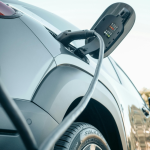Wireless Charging for Cars: Fact or Fiction
While the emergence of electric cars is far from new in today’s fast-paced, technologically advanced world, the concept of wireless charging still seems like science fiction. Wireless EV charging, currently in the pilot product stage in the US, is already being used by Chinese and South Korean automakers on commercial vehicle fleets. Chosen for their consistent routes and their ability to “doc” in specified overnight parking destinations, commercial vehicles serve as the ideal test subject for researching the larger impact of wireless EV charging for the mainstream population’s use.
The Logistics of EV Charging
Similar to how wireless phone charging works, EV wireless charging utilizes magnetic resonance along with a specially made charging pad to create a power-transmitting field, eliminating the need for cords. Equipped with this technology, automakers are working toward a future where drivers would simply pull into an EV wireless charging station, and a light on the car’s dash would appear, alerting them that their vehicle is now charging successfully.
Although skeptics of this so-called futuristic technology have written it off as “idealistic” for factors like expense and the time it takes to obtain a full charge, industry leaders are unscathed by these comments, pushing forward with research and testing efforts to bring mainstream EV charging to fruition.
The paradox, however, still exists for auto manufacturers who are struggling to adopt the needed technology in new EV models, creating a demand for EV wireless charging stations. One expert, Michael Weismiller, a program manager for electrification R&D in the US Department of Energy’s Vehicle Technologies Office cites, “If I was a car manufacturer, I’d probably be reluctant to put it on a vehicle today just because there’s not any wireless chargers out there.”
Ultimately, adoption remains the largest hurdle to EV wireless production moving forward, as the majority of auto manufacturers are unable to justify outfitting their vehicles with the needed technology.
Where We Are Now
In the hopes of encouraging further adoption, US-based company WiTricity is introducing its own version of a wireless charging system for their E-Z-GO and ICON EV golf carts and line of light vehicles, calling the technology Halo. With big-name investors including Mitsubishi Corp. and Siemens AG on board, this smaller-scale demo could propel the technology forward in the auto manufacturer space.
In other recent news, Tesla confirmed the company is pursuing their own wireless charging technology, as confirmed by their design chief, in what is considered EV wireless charging's largest potential market. Despite significant opposition from industry leaders and the general public, EV wireless charging is already used internationally and will make its way to the mainstream US in a yet to be determined capacity, but one thing is for sure: the technology is coming.
Propelling Into the Future with Magnets
From advancements that sound more like science fiction than reality to portable MRI machines, magnets are a crucial piece of the technology enigma researchers and scientists across the globe are committed to cracking. So, whether you are looking for the latest breakthroughs that will leave you wanting more or the perfect practical way to organize your pantry, Apex Magnets has the know-how and quality products you can trust to make your next project happen!
Visit our blog for inspiration and grab your list of products in one easy visit. Give us a call at 1-304-257-1193 or contact our magnetic experts online anytime!

